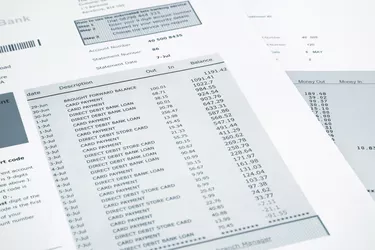
POD on a bank statement means payable on death. You can name a POD beneficiary on any of your deposit accounts, and when you do, that person receives the funds held in the account after your death. Whenever you see POD on a bank statement, the full name of the account's beneficiary should follow the acronym.
What Does POD Stand For?
Video of the Day
If you have a POD noted on a bank statement, it means that person or entity will be paid money on your behalf upon your demise. Depending on how your estate is structured, your assets might not be available if a POD were not in place. In many instances, the estate must be closed out before that any individual or entity receives any funds, unless you have something specifically designating it as a POD to them.
Video of the Day
A POD beneficiary has no rights to money held in your account while you are alive. Your bank cannot allow a POD beneficiary to perform transactions on your behalf, and bankers cannot share any account information with your beneficiary while you are still alive.
If you wish to add a friend or relative to your account to assist with day-to-day managing of your money, you must add that person as a joint owner or obtain a power of attorney that gives the person the right to act on your behalf. This process can be complicated and may vary based on your state or locality, so you should consult an attorney for assistance.
Probate and Estate Settlement
State laws on probate and estate settlement vary, but typically when you die your heirs, creditors and other related parties can make claims on your assets. A probate court reviews your will and disburses your assets in accordance with your will. If no will exists, the probate judge decides how to settle your estate.
The probate process involves many legal costs and often takes months or years to resolve. However, any accounts you own with a designated POD beneficiary are exempt from probate, and the named beneficiary can access funds without delay, explain the attorneys from Landskind & Ricaforte Law.
Insurance From the FDIC
The Federal Deposit Insurance Corp. provides deposit insurance coverage for checking, savings and money market accounts and certificates of deposit that you hold at FDIC member banks.
If your bank files for bankruptcy, the FDIC insures your account balances up to $250,000. If you add a POD to your account, you receive an additional $250,000 of coverage. You can name up to five beneficiaries on one account, which would increase your coverage to $1,250,000.
Eligible Beneficiaries for the FDIC
Historically, the FDIC enabled account holders to name only a child, grandchild, parent, sibling or spouse as a POD beneficiary. However, in 2008, the FDIC relaxed the beneficiary eligibility guidelines. You can now name any living person as a beneficiary.
Many people added the names of close friends or life partners to their accounts after this rule change. You can also name a charity or nonprofit organization as your POD beneficiary, but only if it legally qualifies as such an entity under federal tax laws.